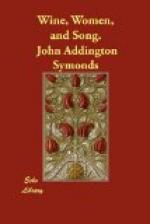From the soothed limbs upward
spread
Glides a mist divinely shed,
Which invades the heart and
head:
Drowsily it veils the eyes,
Bending toward sleep’s
paradise,
And with curling vapour round
Fills the lids, the senses
swound,
Till the visual ray is bound
By those ministers which make
Life renewed in man awake.
Underneath the leafy shade
Of a tree in quiet laid,
While the nightingale complains
Singing of her ancient pains,
Sweet it is still hours to
pass,
But far sweeter on the grass
With a buxom maid to play
All a summer’s holiday.
When the scent of herb and
flower
Breathes upon the silent hour,
When the rose with leaf and
bloom
Spreads a couch of pure perfume,
Then the grateful boon of
sleep
Falls with satisfaction deep,
Showering dews our eyes above,
Tired with honeyed strife
of love.
In how many moods the mind
Of poor lovers, weak and blind,
Wavers like the wavering wind!
As a ship in darkness lost,
Without anchor tempest-tossed,
So with hope and fear imbued
It roams in great incertitude
Love’s tempestuous ocean-flood.
A portion of this descant finds an echo in another lyric of the Carmina Burana:—
“With young leaves the
wood is new;
Now the nightingale
is singing;
And field-flowers of every
hue
On the sward their
bloom are flinging.
Sweet it is to brush the dew
From wild lawns
and woody places!
Sweeter yet to wreathe the
rose
With the lily’s
virgin graces;
But the sweetest sweet man
knows,
Is to woo a girl’s
embraces.”
The most highly wrought of descriptive poems in this species is the Dispute of Flora and Phyllis, which occurs both in the Carmina Burana and in the English MSS. edited by Wright. The motive of the composition is as follows:—Two girls wake in the early morning, and go out to walk together through the fields. Each of them is in love; but Phyllis loves a soldier, Flora loves a scholar. They interchange confidences, the one contending with the other for the superiority of her own sweetheart.
Having said so much, I will present the first part of the poem in the English version I have made.
FLORA AND PHYLLIS.
PART I.
No. 28.
In the spring-time, when the
skies
Cast off winter’s
mourning,
And bright flowers of every
hue
Earth’s
lap are adorning,
At the hour when Lucifer
Gives the stars
their warning,
Phyllis woke, and Flora too,
In the early morning.




